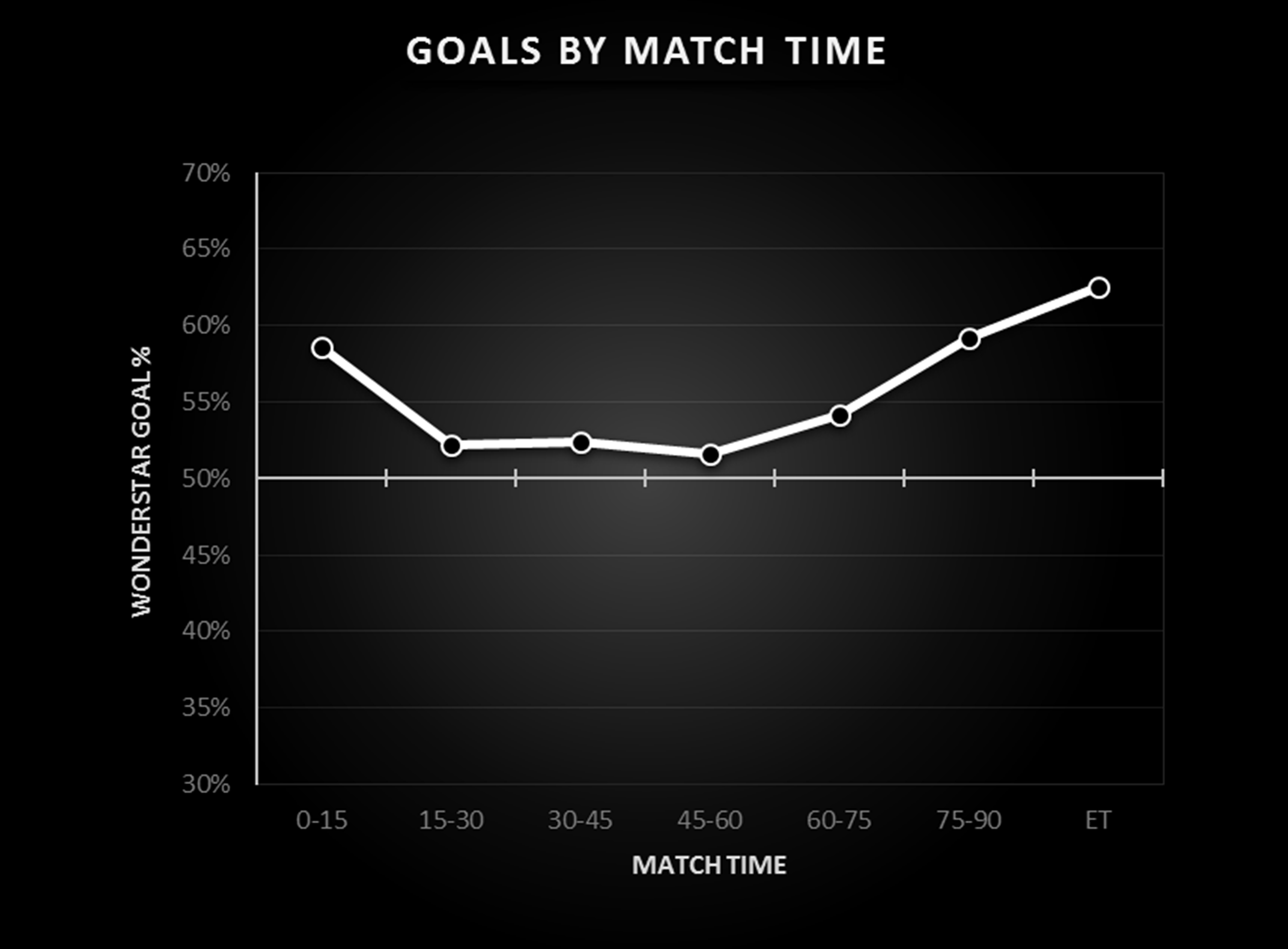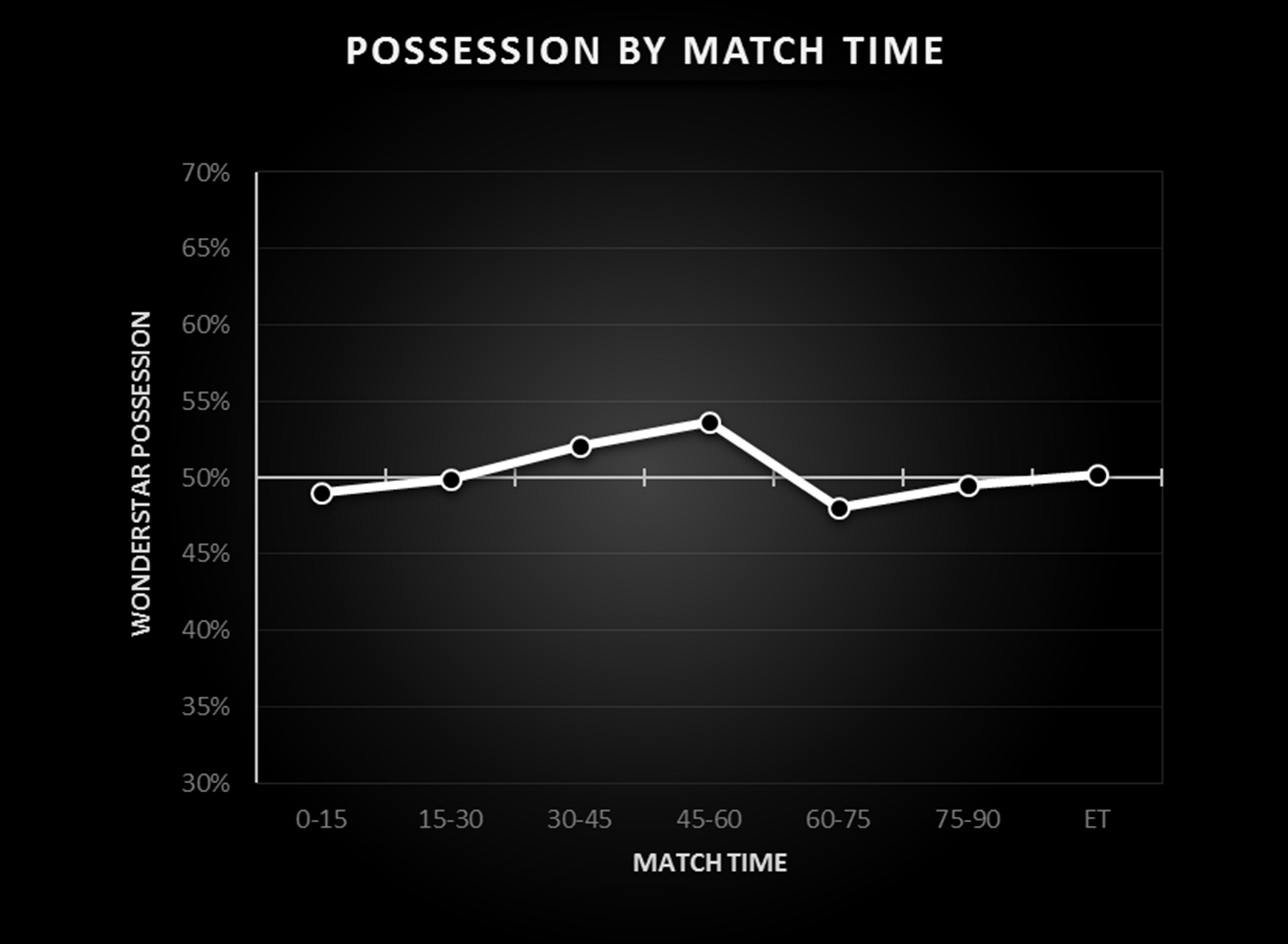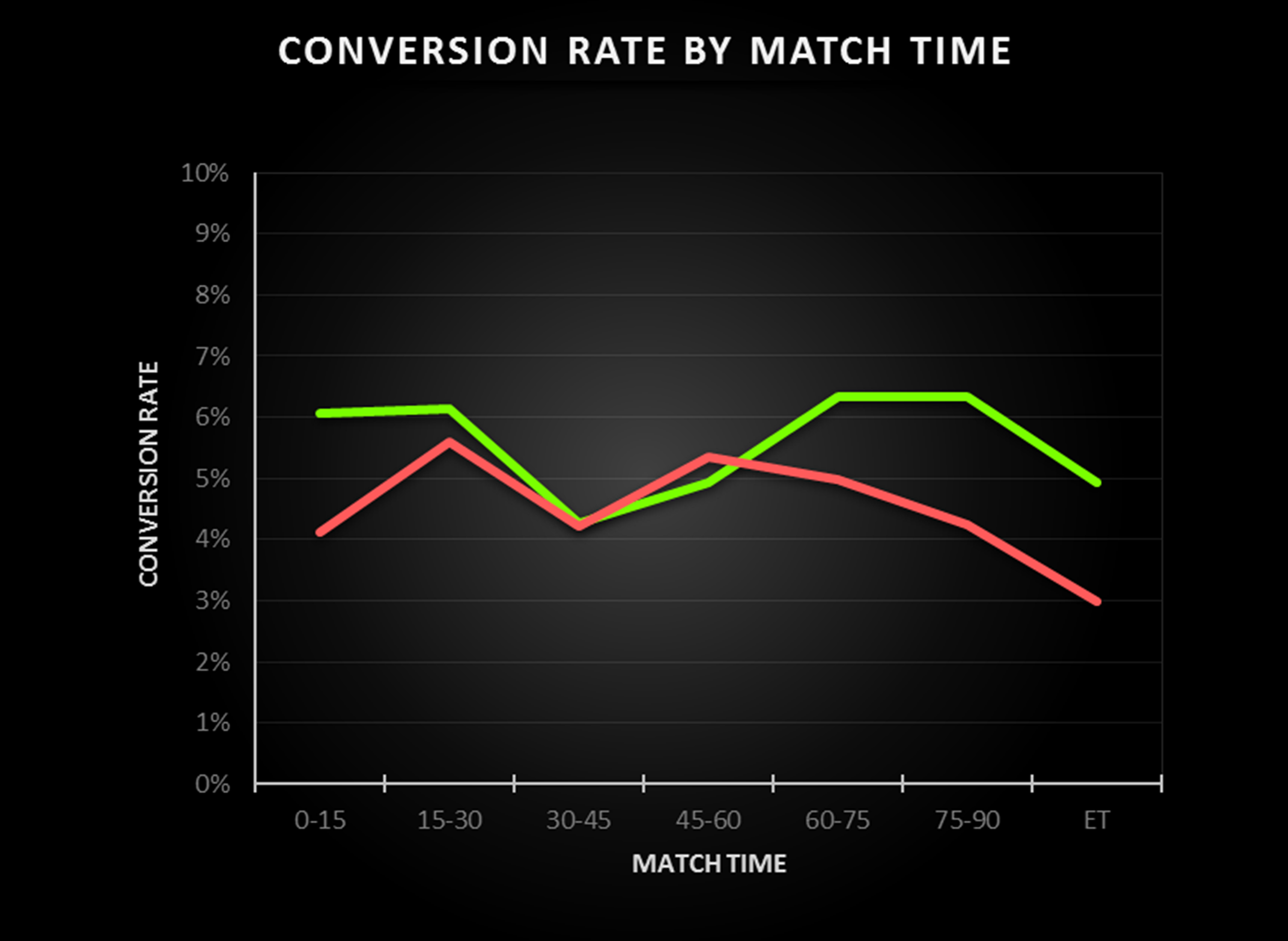| Wonderstar AnalyticsSee all entries in this blog |
Match Analytics Part 1: Stamina & Substitutions (07/03/2014 20:43) |
"The match is not finished before the ref has blown his whistle. Remember what Solskjaer did!" - Chairman
Before I get into some detail with Possession Analytics, here's another interesting thing you can do with very simple match statistics. I imagine most people reading this blog will be relatively experienced and will already know this, but for anyone new to the game:
SUBSTITUTIONS ARE CRITICAL!
The reason for this, again, is that ManagerLeague simulates the match event-by-event, rather than all in one go. Throughout the game your players randomly lose fitness (perhaps players with lower stamina or in certain positions lose more, but I don't actually know), and events towards the end of the match will be affected more and more by the relative fitness of the players left on the field: your star striker will be more likely to scuff his 85th-minute shot wide if he's been on the pitch the whole game. The best way to mitigate this is to be sure to use all three of your substitutions every match. I set a simple event in the 60th minute to just sub out my least fit defender, midfielder and attacker, regardless of their quality or how well they're performing, and replace them with some fresh legs. Here's the result:
Figure 1: Proportion of goals scored by The Wonderstars by match stage. Data from 191 matches, Seasons 109-111.
If you read the previous post, you'll know that I've been looking at the number of goals I scored relative to my opponents over the past three seasons. Here I've looked at all three seasons worth of data and recorded the time each goal was scored. That means I know how many goals I scored and conceded at different stages during a match, which is what I've plotted above in 15-minute increments (the exception is extra time, which includes the full 30mins but not penalty shootouts). Values above 50% mean I scored more than half of the goals during that stage (i.e., I scored more than I conceded). We can see a couple of things straightaway. First off, my team seems to come quicker out the blocks than my opponents, scoring almost 60% of the early goals in a game, but then I'm pretty evenly matched with my opponents until around 60 minutes. At that point, I get increasingly dominant as the rest of the second half wears on, and if we end up in extra time I score nearly 2 goals for every one I concede. My guess is that the middle portion of the match is my "natural" level of scoring, but that two factors give me an advantage in the first 15mins and the last 30mins. Let's take the first 15mins - it's too early for fitness to really be much of a factor, so what's changing around the 15th minute? Well, not my tactics. I pick a formation, style and pressure that I think is going to work for me and pretty much stick with it (see the previous post). So perhaps my opponents tactics are changing? Well, if you read the popular guides, several suggest a strategy of changing your tactics very early in the game. The reasoning behind this is that match summaries - which is what most people glance at if they're scouting an opponent - only show you the starting formation, style and pressure for each team, and you have to read the match report itself to see if the tactics change during the match. So many teams deliberately begin the match with tactics they don't really intend to use, just so it shows up on the match report and fools their future opponents. Then after a minute or 15 they set an event to switch to their "real" tactics. If you believe that particular tactics are inherently advantageous against other ones - things like "4-5-1 continental beats 4-3-3 mixed" - then this strategy should give you an advantage, as your opponent might set up to counter your "fake" strategy instead of your real one. I don't believe that by the way - though my mind can always be changed with data! - so I just adopt my strategy to fit my own team and pay relatively little attention to my opponents. But it's possible that some of my opponents are playing a weaker fake strategy or out-of-position players in the early part of the game (even if it's just for the first minute, remember minute 1 always has a passage of play from the kick-off), and that's what's giving me a relative advantage. I could be completely wrong about this and it might all be luck, but it's an interesting possibility to ponder, especially if you use that "fake tactics" strategy yourself. The late-game advantage, on the other hand, begins from 60mins and gets stronger as the game wears on, and I don't think it's a coincidence that 60 minutes is when I make my substitutions. Although many of my opponents make substitutions of their own, some don't - or substitute players based on quality or performance instead - and so the fact that I always do means that on average, I tend to keep a greater proportion of my fitness in the later stages of a game. It's interesting to note, though, that possession doesn't seem to be affected:
Figure 2: The Wonderstars possession by match stage. Data from 191 matches, Seasons 109-111.
So if my possession isn't changing, but my goal percentage has improved, then I must be getting a better conversion rate than my opponents, right? Correct! You've been reading this blog carefully. In the figure below, I've plotted both my conversion rate (green) and that of my opponents (red) separately. This lets us see what's going on in general with conversion rates, as well as how I compare to my opponents:
Figure 3: Conversion rates by match stage. Data from 191 matches, Seasons 109-111.
Just as we suspected, the advantage I have over my opponents in the first 15mins and last 30mins seems to come from a superior conversion rate (the green line moves above the red line), instead of any change in possession. That suggests that fitness mostly affects individual player performance, and not the amount of possession (which instead comes from formations, quality and teamstats). Notice too the overall trend for conversion rate, which could reveal a little about how the sim is working. First off, the weird blip in the first 15 minutes for my opponents may be a result of switching out of a fake formation. If they do so without subbing players, starting the game with a fake formation means at least one player will be out of position - so for example two attackers might be on the right side of midfield until the formation switches from 4-5-1 to 4-3-3. Being out of position tends to lead to bad player performance (yes yes, I know your midfielder has a higher shooting stat than your second striker, but resist the urge), which could cause the drop in conversion rate - one of those strikers goes to cross the ball and hoofs it right of play. So, if you ignore that blip, you see pretty constant conversion rates for the first 30 minutes, but a dip as the first half wears on. Then for the first 15 minutes of the second half, things improve again. And after 60 minutes, conversion rates for my opponents start decreasing - and fall all the way down to a drastically-bad 3% by extra time. So it looks like fitness (hence player performance on things like passing and shooting, hence conversion rates) decreases throughout the match, with a little bump back up after half time thanks to the restorative power of orange slices. But because I always bring my least fit players off at 60 minutes and replace them with fresh legs, that is sufficient to push my conversion rate back up over 6% for most of the second half (before slipping back down again as we get into extra time). By keeping my conversion rate intact while my opponents' declines, I end up scoring more goals over that phase of the match than my team quality would cause you to expect - even though the quality of my lineup has decreased after bringing on three lesser players. So always use your substitutes! Finally, you could even go so far as to speculate that the least-fit-players-out-at-60-minutes approach is the optimal substitution strategy. Since players get a bit of a boost at half time anyway, it doesn't seem so advantageous to make the substitution after 45 minutes because you're not improving your team's average fitness by enough (note my opponents seem to gain more fitness after 45 minutes than I do, perhaps because some of them make substitutions at half time and I don't). On the other hand, if you leave it too late, you're only getting 15 minutes worth of fresh legs. And bringing off your least fit players maximises the effect; while it's tempting to leave your best performers on the field, if events are independent there's no guarantee they'll continue to perform strongly as their legs get heavy. But anyway! Always use your substitutes!
- Belizio
|
| Share on Facebook |
| This blogger owns the team The Wonderstars. (TEAM:154471) |
|
You are currently not logged into ManagerLeague If you wish to log in, click here. If you wish to sign up and join us, click here. |
|
| MKManager79 wrote: 22:42 22/05 2014 |
|
| Belizio wrote: 23:59 22/05 2014 |
|
| MKManager79 wrote: 12:24 24/05 2014 |
|
| Belizio wrote: 02:58 25/05 2014 |
|
| Post a comment |
|
| © 2003-2007 Fifth Season AS, Oslo, Norway. Privacy Policy. Rules and Code of Conduct. Sitemap. Responsible Editor for ManagerLeague is Christian Lassem. |





